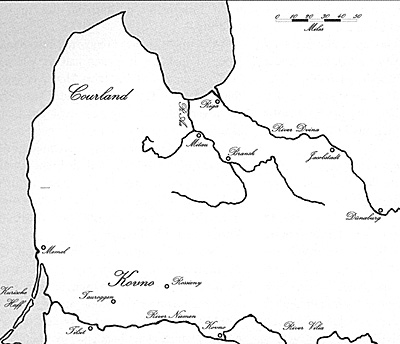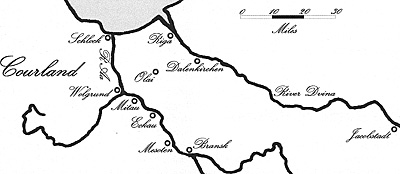Napoleon’s Eagles (Part 4)
Russia 1812
MacDonald's Forgotten Campaign
by Kevin Birkett, FINS, Eire
| |
While tens of thousands of men were dying on the road to Moscow far to the north in Courland Marshal Macdonald was engaged in a largely isolated campaign of his own. Crossing the Niemen at Tilsit on the morning of the 24th June Macdonald’s X Corps, consisting of the Prussian contingent, and of a division formed of three Polish regi-ments, one Bavarian, and one Westphalian, had made good progress, driving the weak Russian outposts in the area before it. Having occupied Rossieny, on the 4th July the X Corps resumed its advance; the Prussians on Mitau while Macdonald together with Grandjean marched on Bransk and then Jacobstadt on the Dvina, which they took on the 18th. Shortly after reaching Jacobstadt Macdonald received new orders, he was to march immediately on Dünaburg to maintain communications with Oudinot as the II Corps advanced on Polotsk. Approaching the fortress with great caution, it had previously withstood a determined assault by Oudinot, Macdonald had every expectation of a long drawn-out siege however on the 26th the Russians, reluctant disperse their troops further, withdrew leaving the citadel in the hands of the French. With Dünaburg safely in its hands Grandjean’s division, having already lost 4,000 of its 12,000 men through detachments and desertions, set about the onerous task of maintaining communications with Oudinot and watching over some 200 miles of the Dvina. The Prussians too had suffered greatly from strategic consumption. Forced to leave men to watch the navigation of the Niemen and the Kurische-Haff only some 12,000 men were available for operations around the maritime fortress of Riga. The first intimation of the problems to come occurred when Russian troops advanced on Eckau to intercept communications between the Prussian commander, Grawert, and Macdonald. On the 19th July, seeking to reopen communications, Grawert sent a column under the command of Kleist against the Russian positions. Although ultimately successful in his assault the resistance mounted by the Russian force, largely depot battalions and militia supported by artillery, could have left the Prussians in little doubt that an assault on Riga would be a prolonged and costly affair. The next incident came on the 5th August when Russian troops supported by British gunboats sailed up the River Aa, bombarding the coastal village of Schlock forcing its garrison to flee into nearby marshes, before finally being defeated two days later by Kleist at Wolgrund just six miles from Mitau. On the 22nd the Russian commander, Essen, again attempted to disrupt Prussian preparations for a siege: the siege train had crossed the Niemen on the 30th July. Believing that the Prussian right was vulnerable Essen launched an overwhelming attack on Dahlenkirchen while other assaults were undertaken against Olai and Schlock. Following these clashes this front remained relatively quiet until the 26th September when the arrival of Steinheil’s Army of Finland in Riga tipped the balance of power in favour of the Russians allowing them to assume the offensive. Aware that the French siege train was positioned in Gräfenthal, on the 27th Steinheil launched a major offensive in the direction of Eckau, forcing a bridgehead across the River Aa in the face of stiff opposition from Yorck, who had succeeded Grawert in command of Prussian forces.
Concentrating the Prussian forces he launched furious counter-attacks on the 29th at Mesoten and Gräfenthal and the following day at Lautschkruge before finally driving the Russians across the river Garosse and back into Riga on the 1st October. While undoubtedly a victory for the Prussians the series of clashes around Riga did little to upset the Tsar’s strategic plans for a few days later Steinheil moved south to join Wittgenstein. Macdonald too was on the move. Informed of the clashes on the 30th September he had left Dünaburg with elements of Grandjean’s division but arrived only in time to heap praise on the Prussians for their defence of the siege lines and the siege artillery. Positioned in Gräfenthal the siege artillery had been the main target of the Russian assaults. With the season already late for commencing a formal siege and the enormous, it had taken 40,000 horses to move, and valuable train too exposed to further Russian attacks, Macdonald ordered it back to Danzig. As the winter began to lay its icy hand on the region disturbing but vague reports reached Macdonald concerning the fate of the Grande Armée. Reacting to the news Macdonald began to draw in his outlying units; movements that did not go unnoticed in Riga. Believing that the X Corps was about to retreat the Russians mounted numerous attacks to harass Macdonald’s forces. However one such attack on the 15th November at Dahlenkirchen resulted in disaster when the Prussians, led for the day by the French general Bachelu, were ambushed and decisively beaten leaving around 1,000 prisoners in German hands. The victory could have been even more decisive had Yorck followed up the retreating Russians as ordered but relations between Macdonald and his allies had grown cold. Nevertheless the victory of the 15th had given the X Corps some breathing space, Macdonald would maintain his positions around Riga and await developments further south. Concludes next issue Napoleon's Eagles (Part 4) Invasion of Russia 1812
Road to Berezina The Landlocked Admiral Northern Pincer and 2nd Polotsk MacDonald's Forgotten Campaign Jumbo Map of Battle of Maloyaroslavets (extremely slow: 142K) Napoleon's Eagles (Part 3) Invasion of Russia 1812
Battle of Borodino Interregnum and Retreat Battle of Vinkovo Jumbo Map of Battle of Borodino (extremely slow: 372K) Napoleon's Eagles (Part 2) Invasion of Russia 1812
Battle of Smolensk Sideshow: Oudinot's Dvina Campaign First Battle of Polotsk Volhynian Summer Jumbo Map of Battle of Smolensk (very slow: 278K) Napoleon's Eagles (Part 1) Invasion of Russia 1812
From the Niemen to the Dvina Battle of Saltanovka Maneuver of Vitebsk Battle of Ostronovo Maneuver of Smolensk Back to Table of Contents -- First Empire # 81 Back to First Empire List of Issues Back to MagWeb Master Magazine List © Copyright 2004 by First Empire. This article appears in MagWeb.com (Magazine Web) on the Internet World Wide Web. Other articles from military history and related magazines are available at http://www.magweb.com |
 24th June to 15th November 1812
24th June to 15th November 1812
 Distracted by events elsewhere, that same day the garrison
of Mitau allowed itself to be surprised by
Essen. Although shaken Yorck was undeterred.
Distracted by events elsewhere, that same day the garrison
of Mitau allowed itself to be surprised by
Essen. Although shaken Yorck was undeterred.